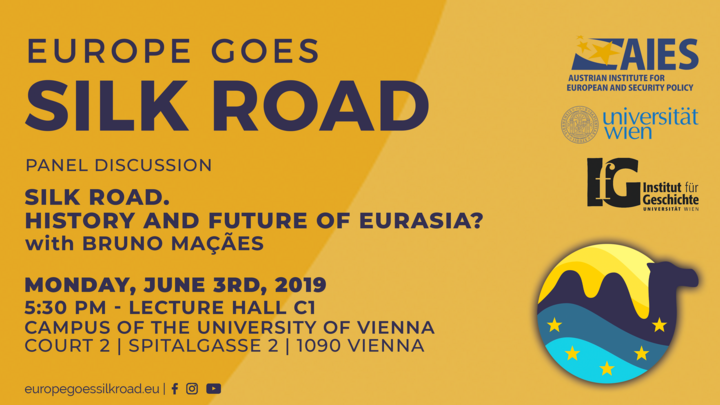Montag, 03. Juni 2019, 17:30 - 19:30 iCal
Silk Road. History and Future of Eurasia?
Panel Discussion with Bruno Maçães
Lecture Hall C1, Court 2, Campus of the University of Vienna
Spitalgasse 2, 1090 Vienna
Diskussion, Round Table
Welcoming Words:
Friedrich Edelmayer, Professor for Global History at the University of Vienna
Keynote Speech:
Bruno Maçães, Senior Fellow at the Hudson Institute Washington, D.C., Senior Fellow at Renmin University in Beijing, former Portuguese Europe Minister
Short Presentation EUROPE GOES SILK ROAD & LiveDocs:
Florian Krendl, Sebastian Maier, Maximilian Auer, Co-Founders of EUROPE GOES SILK ROAD, Daniel Aigner, CEO at Deckweiss
Panel Discussion:
Panellists:
Bruno Maçães, Senior Fellow at the Hudson Institute Washington, D.C., Senior Fellow at Renmin University in Beijing, former Portuguese Europe Minister
Velina Tchakarova, Director of the Austrian Institute for European and Security Policy
Sebastian Holler, Co-Founder of EUROPE GOES SILK ROAD
Moderator:
Friedrich Edelmayer, Professor for Global History at the University of Vienna
Topic:
China’s Belt & Road Initiative, commonly known as the New Silk Road, is increasingly dominating international and national headlines. Announced by the Chinese president Xi Jinping in 2013, this gigantic project aims to strengthen the economic integration of Europe, Asia, Africa and the world. However, not only China wants to promote connectivity between Asia and Europe, but also Russia, India, Iran and the European Union. All their endeavours reflect partly complementary, partly competing visions of a multidimensionally interconnected Eurasia. These geo-economic attempts are not solely about infrastructure construction and transport time reduction but are in fact underway of heralding a new era of globalization in an increasingly multipolar world that according to the best-selling author Bruno Maçães will make the 21st century a Eurasian century. In this context the narrative of the Silk Road has been resurrected to construct a worldhistorical continuity between the legendary trans-Eurasian network of the past and present efforts to shape the world of tomorrow. Thereby, reconnecting the supercontinent will have multiple implications in terms of economy, politics, security, identity and culture. But what do these endeavours that entail all parts of life mean for Europe? And what do we need to learn about Eurasia to continue helping to shape its future?
Veranstalter
Kontakt
Sebastian Holler
EUROPE GOES SILK ROAD
+436605763501
office@europegoessilkroad.eu
Erstellt am Dienstag, 28. Mai 2019, 14:06
Letzte Änderung am Mittwoch, 29. Mai 2019, 10:08

